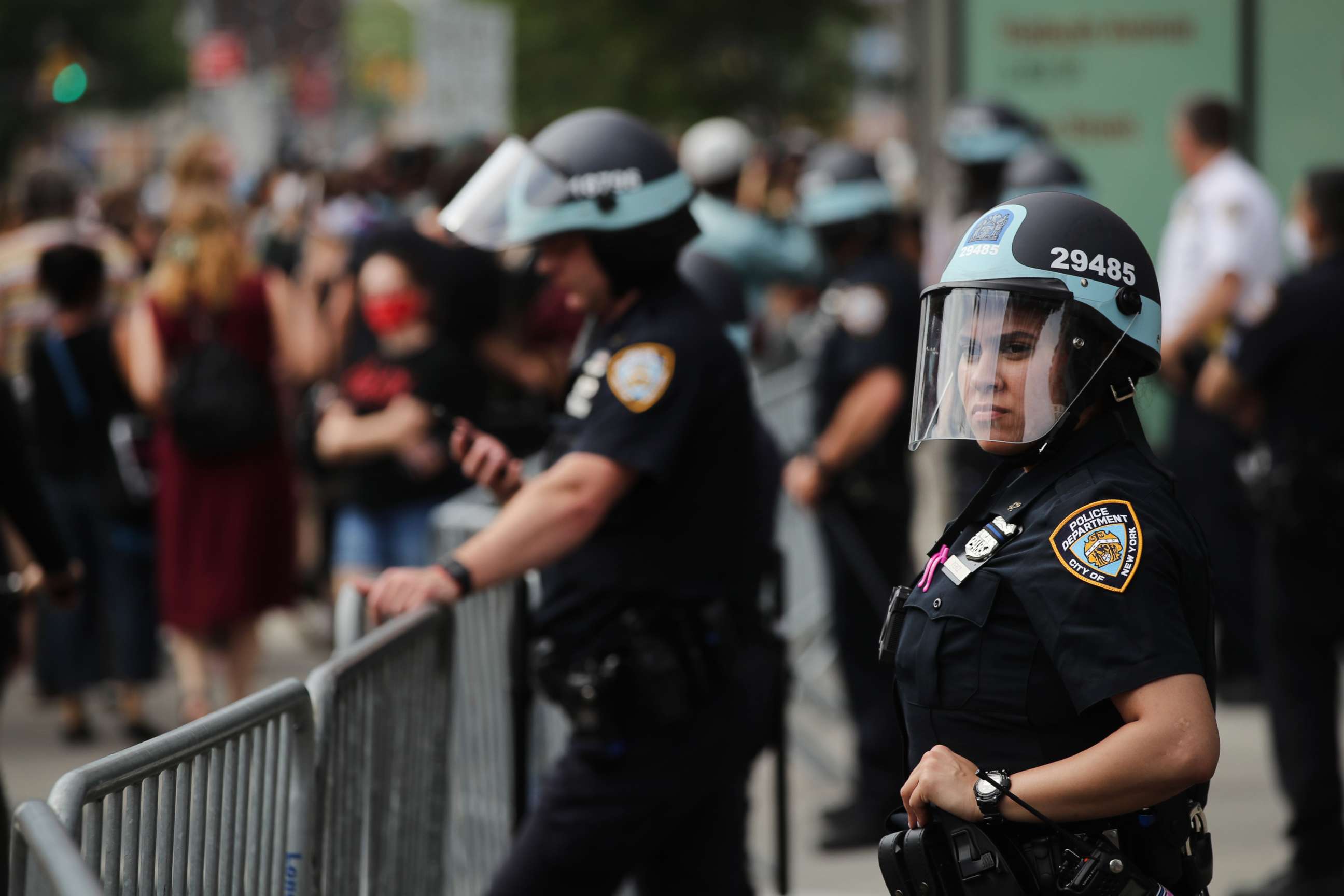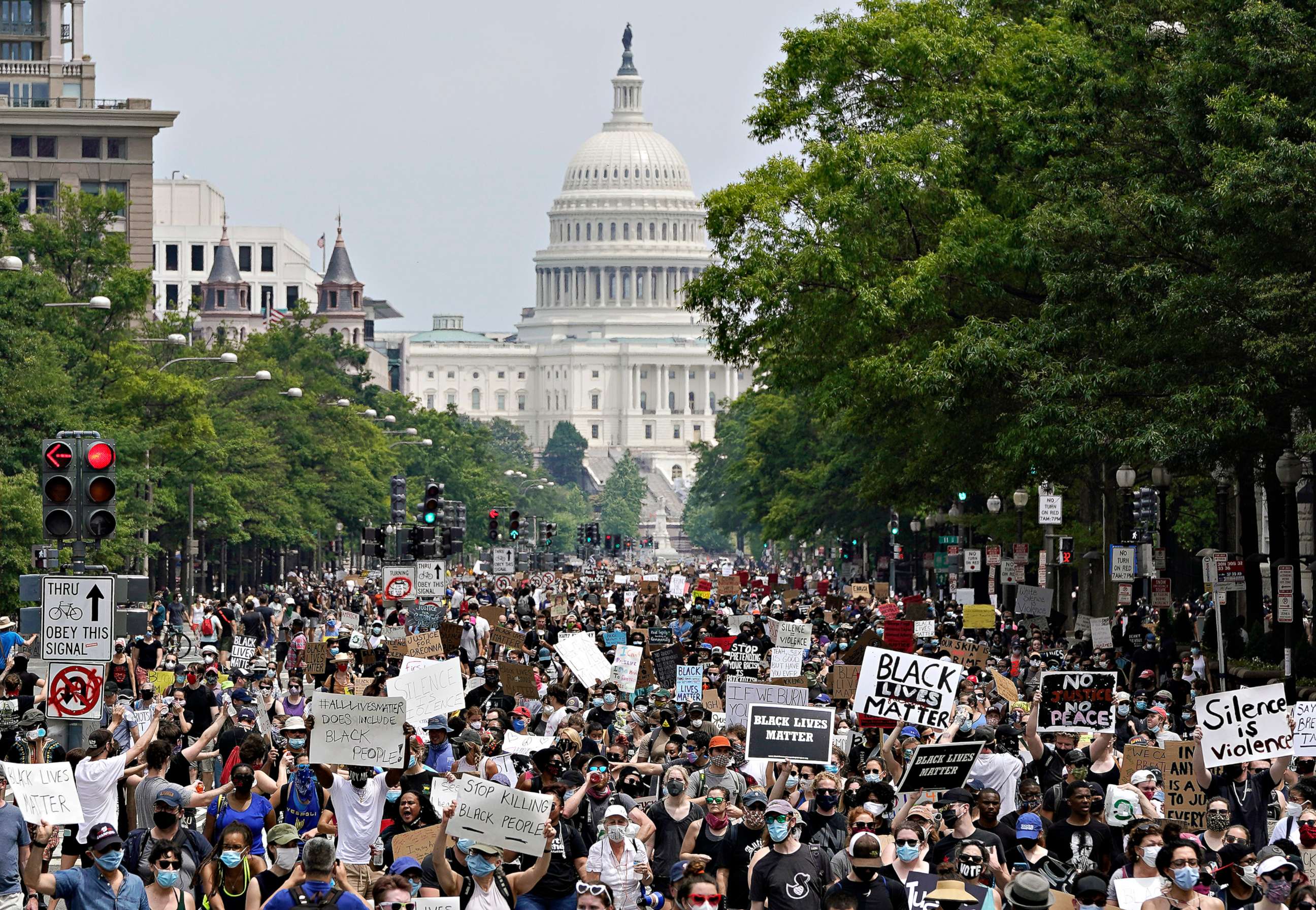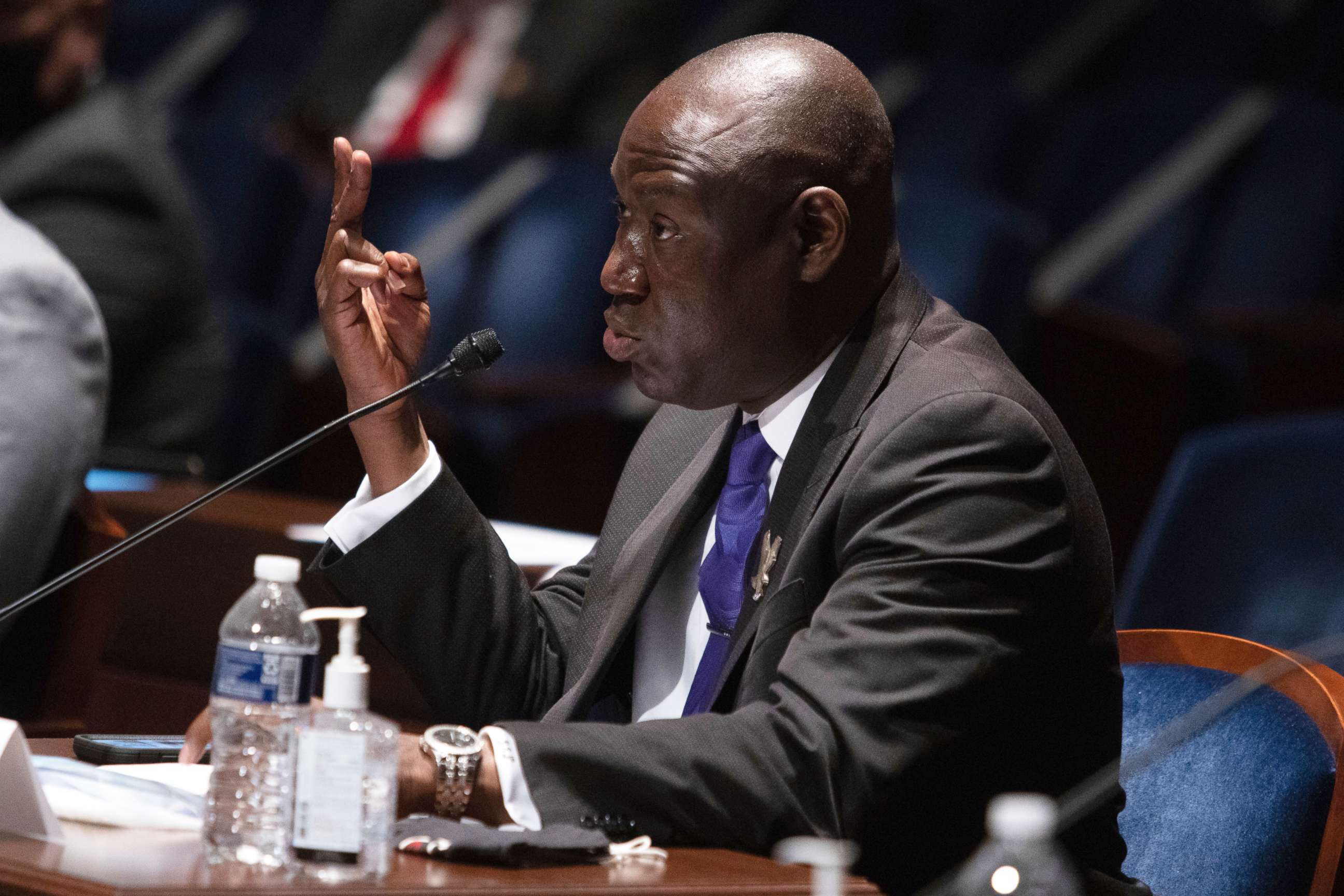
Thousands of police misconduct lawsuits are filed every year.
June 14, 2020, 10:12 AMBlack Lives Matter protesters fight with supporters of US President Donald Trump as police try to break up the clashes during a demonstration due to the police killing of George Floyd in Huntington Beach, California, June 6, 2020.
EUGENE GARCIA/EPA via ShutterstockFalse arrests, civil rights violations and excessive force are just a handful of claims made against police departments across the country by the thousands every year.
Amid massive protests over the last few weeks on the heels of the death of George Floyd while in police custody, demonstrators and law enforcement officials have clashed.
As a result, some officers in cities from Atlanta to Philadelphia to Buffalo have been disciplined for alleged misconduct against protesters and opened the door to the possibility of countless civil lawsuits, legal experts told ABC News.
While data shows that claims against police are down in cities with the largest police forces in the country, they still cost taxpayers over $300 million in fiscal year 2019. Advocates say that tax money could be better spent.

"The taxpayers are going to bear the brunt for the cost of police brutality," Sanford Rubenstein, a New York City-based civil attorney whose firm has represented families and victims of police brutality for over 35 years and collected millions of dollars in settlements.
The New York Police Department is the largest police force in the country with over 36,000 members servicing a city of 8.3 million people.
During fiscal year 2019, the city paid out $175.9 million in civil judgments and claims for police-related lawsuits -- not including settlements made with the city's comptroller's office, said Nick Paolucci, a spokesman with the city's Law Department -- the agency that defends the city and its employees in lawsuits.
In 2019, the city's comptroller's office dished out almost $4 million in settlements to almost 200 pre-litigation civil rights and police action claims that included excessive force, according to data obtained by ABC News for settlements between 2014 and 2019.
"In New York City at least, it's not like the police's budget. Budgets for settlements from lawsuits . comes from the city, and that's taxpayer money," said Jennvine Wong, staff attorney with The Legal Aid Society's Cop Accountability Project, Special Litigation Unit.
Employees of government agencies like the NYPD have immunity from contributing to a settlement or judgment if named in a lawsuit where an accusation of misconduct is made while the employee is on the job.
For notice of claims and lawsuits filed against New York City, the Mayor's Office of Management and Budget allocates funds every fiscal year -- $733 million in 2020 and $697 million in 2019 -- for payouts. In instances where a government employee is ordered to contribute to a payout, the amount is very small, legal experts said.
For fiscal year 2021, 6 cents of every dollar will go to miscellaneous spending including "labor reserve, general reserve, judgments and claims, MTA subsidies and other contractual services," according to the city's executive budget from the OMB.

"That's a lot of money that we are paying out for the misconduct of many cops that are still allowed -- many, not all -- to stay on the force or probably are not even disciplined," said Wong.
Wong said that as conversations of defunding the police continue, there should be consideration for allocating the funds to public health crises like "gun violence, poverty, drug addiction and in treating those in a more efficient manner." Funds would then go to attacking community problems at the root cause and could result in "a less of a need for policing to begin with," she said.
In a letter sent to to Mayor Bill de Blasio on June 4, Comptroller Scott Stringer urged cutting $1.1 billion from the NYPD's budget over the next four years and to reinvest into the community as a result of $1.3 billion spent since 2014 as the consequences of alleged police misconduct.
"Acting aggressively to identify and hold officers accountable for police misconduct will not only save dollars in future lawsuits, it will spare many New Yorkers the needless pain and suffering stemming from the unnecessary use of force or other violations of civil rights," according to the letter.
Hazel Crampton-Hays, the press secretary for Stringer, said in a statement to ABC News that she agrees that "New York City must invest more in underserved communities most impacted by violence and structural racism."
For several years, advocates and lawmakers have made efforts to change legislation that protected government officials like police officers from discipline.
New York state lawmakers were successful on June 9 in repealing Section 50-A that prevented the release of a police officer's personnel records. Governor Andrew Cuomo signed the legislation on Friday.
The following day, attorney Ben Crump spoke before the House Judiciary Committee about the effects of the "qualified immunity," which prevents filing a lawsuit against police officers as an individual, unless they were found to have violated a federal law. The Supreme Court is expected to decide if it will review qualified immunity laws.
"Immunity breeds impunity for these police," said Crump, who represents several families of black people who died in encounters with the police, including Floyd and Breonna Taylor, who was shot to death by police during a "no-knock" warrant raid. "If they have this qualified immunity, we see no accountability."

Notice of claims filed against the NYPD that settled with the city's comptroller's office during fiscal year 2019 cost taxpayers $220.1 million, compared to $237.4 million in the previous year and a 35% decrease from the $338.2 million paid out in 2017, according to the comptroller's annual report released on Friday. Of those 5,848 claims filed, 61% were for accusations of "police action" such as false arrest or imprisonment, excessive force or assault, or failure to provide police protection.
However, Rubenstein believes that "given the recent epidemic of police brutality during the pandemic, settlements from expected lawsuits will be a rather large expense."
Here is a look at claims in other cities with the largest police forces in the country:
Los Angeles, with a population of over 4 million, had an increase of lawsuits filed against law enforcement over the last three fiscal years, according to the city's chief executive risk management's annual report published in January.
Of the 606 claims filed during the 2018-2019 fiscal year, 539 were against the Los Angeles County Sheriff's Office -- the authoritative arm of several law enforcement agencies including the Los Angeles Police Department. Two-hundred and forty one lawsuits were dismissed without any payments, according to the county's County Counsel Annual Litigation Cost Report.
The county budgeted $148.5 million where $91.5 million was paid to satisfy 16 judgments, including $16.3 million paid for nine lawsuits against the Sheriff's Department and 240 settlements, according to the annual litigation cost report. "This marks a 24% increase over the $73.7 million the county expended on judgments and settlements" from the previous fiscal year, the report read.
Of the settlements from the 2018-2019 fiscal year, there were nine made against the Sheriff's Department and another form of law enforcement that accounted for 56% of the $60.4 million in expenses -- a 1% decrease from the previous fiscal year. The county spent $81,485,430 in litigation expense for the Sheriff's Department, according to the annual litigation cost report.
The city has budgeted $19.4 million for "judgments and damages/insurance" for at least the last three fiscal years, according to the county's final budget.
Law enforcement liabilities made up 43.1% of lawsuits filed against the city during the 2018-2019 fiscal year, according to the risk management's annual report. Compared to the 6.5% of law enforcement liability claims from the 2017-2018 fiscal year where $40.6 million was paid by cost taxpayers.
The LAPD has approximately 9,000 sworn officers and 3,000 civilian employees, according to the agency's most recent COMPSTAT report. In 2016, when the agency had a reported 11,954 officers, according to the FBI's full-time law enforcement employees database, the amount of law enforcement liability claims were at 491 during that fiscal year.
The city increased the amount of "corporate fund" resources -- operations and services such as public safety which includes the police department -- available to pay for routine settlements and judgments costs.
"Revenue within the corporate fund is derived from local taxes, intergovernmental taxes, non-tax revenue, proceeds and transfers and prior year available resources," according to the city of Chicago's 2018 Annual Financial Analysis.
The city has a population of over 2.7 million with a total of 13,135 law enforcement officers that include 11,954 police and 1,181 civilian members, according to the FBI's 2016 full-time law enforcement employees database.
Expenditures of the corporate funds had an estimated $99.8 million figure to go towards claims, refunds, judgments and legal fees by the end of 2018, the document read. The city's financial analysis projected spending $45 million in 2019 on those same expenses.
In 2018, more than $85 million of taxpayer funds were used to settle police misconduct lawsuits -- the highest amount since 2011 -- and an additional $28 million to outside lawyers to defend these cases, according to data analyzed by the Chicago Reporter. For the prior year, over $32 million were paid to settle police-related lawsuits and $23 million in lawyer fees.